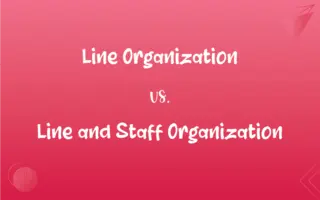Model vs. Framework: What's the Difference?
Edited by Aimie Carlson || By Harlon Moss || Published on February 8, 2024
Model is a representation or simulation of a system or concept. Framework is a structural plan or basis of a system.

Key Differences
A model is a representation, often simplified, of a real-world process, object, or concept, designed to offer insight or predictions, whereas a framework is a set of guidelines or rules used to structure, inform, or guide processes and thinking.
Models are often used to simulate scenarios, make predictions, or understand complex systems, whereas frameworks provide an overarching structure or methodology for approaching a problem or project.
In science and engineering, models are created to represent physical systems, like climate models, while frameworks are used to structure research methodologies or software development processes.
Models can be physical, mathematical, or conceptual representations of reality, whereas frameworks are more abstract, offering a conceptual structure rather than a direct representation.
In business, models can refer to business strategies or revenue models, while frameworks might refer to management structures or organizational strategies.
ADVERTISEMENT
Comparison Chart
Definition
A representation or simulation of a system
A structural plan or basis of a system
Purpose
To represent, predict, or simplify complexity
To provide guidelines or structure
Nature
Often specific and detailed
Generally abstract and high-level
Usage
Used in simulations, predictions
Used in planning, methodologies
Examples
Economic models, architectural models
Theoretical frameworks, software frameworks
ADVERTISEMENT
Model and Framework Definitions
Model
A representation of a system or process.
The architect created a scale model of the new building.
Framework
A basic conceptual structure.
The theoretical framework guides the research study.
Model
A simplified version of a complex reality.
The scientist developed a climate model to predict weather patterns.
Framework
An essential supporting structure.
The new policy provides a framework for environmental regulation.
Model
A specific type or design of a product.
The latest model of the smartphone features a larger screen.
Framework
A set of rules or guidelines.
The software framework simplifies app development.
Model
A person or thing that serves as an example.
She is a role model for aspiring athletes.
Framework
A system of rules, ideas, or beliefs that is used to plan or decide something.
The company's strategic framework focuses on sustainability.
Model
A mathematical representation of a process.
Economists use models to forecast market trends.
Framework
An organizational or conceptual structure.
The educational framework sets standards for schools.
Model
A small object, usually built to scale, that represents in detail another, often larger object.
Framework
A structure for supporting or enclosing something else, especially a skeletal support used as the basis for something being constructed.
Model
A preliminary work or construction that serves as a plan from which a final product is to be made
A clay model ready for casting.
Framework
An external work platform; a scaffold.
FAQs
What is a framework?
A framework is a set of rules or guidelines used to structure something.
Is a model always accurate?
Models aim to be accurate but are simplifications and may not capture every detail.
Can models be physical?
Yes, models can be physical, like a scale model of a building.
Are frameworks always rigid?
Frameworks provide structure but can be flexible to adapt to different contexts.
Do frameworks apply to organizational structures?
Yes, frameworks can be used to define organizational structures and strategies.
Can frameworks be applied in any field?
Yes, frameworks can be used in various fields like business, education, or technology.
How do models help in understanding complex systems?
Models simplify and simulate complex systems to make them easier to understand and predict.
Is a model always a smaller version of something?
Not always; models can be abstract, like mathematical models, and not necessarily smaller.
Can frameworks limit creativity?
While providing structure, frameworks can sometimes limit flexibility and creativity.
What is a model in simple terms?
A model is a simplified representation of something complex.
Can frameworks be universally applied?
Frameworks are often tailored to specific contexts and may not be universally applicable.
Are frameworks important in software development?
Yes, frameworks provide essential guidelines and tools in software development.
Can a model exist without a framework?
Yes, models can be developed independently of frameworks.
Are models used in decision-making?
Yes, models are often used to predict outcomes and assist in decision-making.
How are models tested for accuracy?
Models are tested through experiments, simulations, or comparing predictions with reality.
Do models always need data?
Most models, especially scientific and economic ones, require data for accuracy.
Are frameworks subject to change?
Frameworks may be updated or revised based on new information or changing needs.
Do frameworks evolve over time?
Yes, frameworks can evolve as new insights and practices emerge.
Can a model be a person?
Yes, in certain contexts, a model can be a person who serves as an example to others.
Is a framework tangible?
Frameworks are usually conceptual and not physically tangible.
About Author
Written by
Harlon MossHarlon is a seasoned quality moderator and accomplished content writer for Difference Wiki. An alumnus of the prestigious University of California, he earned his degree in Computer Science. Leveraging his academic background, Harlon brings a meticulous and informed perspective to his work, ensuring content accuracy and excellence.
Edited by
Aimie CarlsonAimie Carlson, holding a master's degree in English literature, is a fervent English language enthusiast. She lends her writing talents to Difference Wiki, a prominent website that specializes in comparisons, offering readers insightful analyses that both captivate and inform.
































































